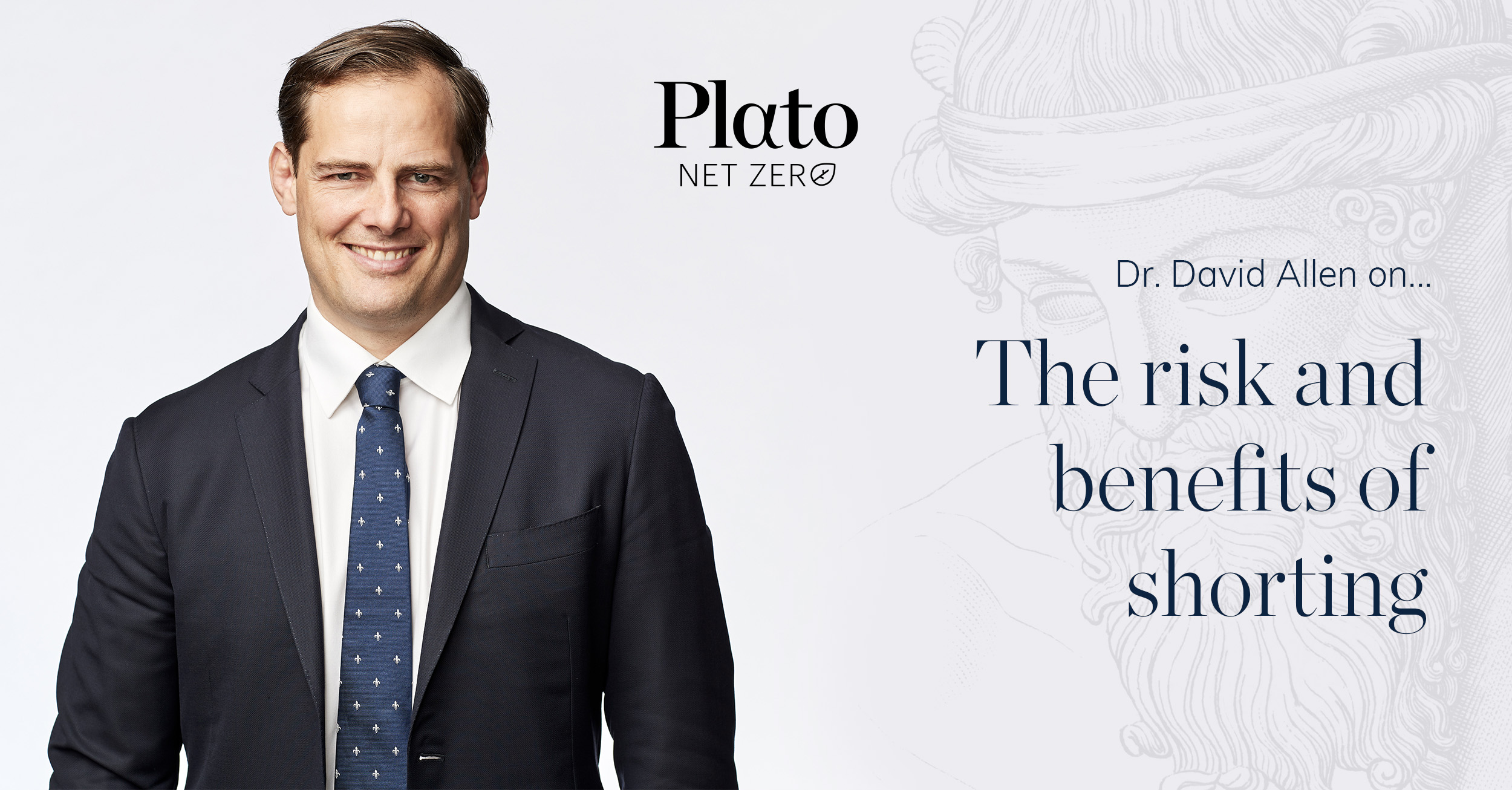
Dr. David Allen
Short selling, the practice of wagering that a stock price will move down rather than up, has been a feature of stock markets for hundreds of years. In fact, short selling has existed ever since the world’s first stock markets emerged in the Dutch Republic in the early 1600s. In this insight we look at the benefits and risks of shorting.
What are the benefits?
When we have a bullish view on a company, we can buy the shares in anticipation of being able to sell at a higher price. What if we have a bearish view, for example we may have uncovered accounting fraud, managerial malfeasance, or simply believe a company will miss their earnings guidance? If we are a long-only investor we can only watch from the sidelines as our view is borne out (or not). If we are able to short companies however, we can take short positions and profit if the price goes down. In this sense, shorting magnifies the opportunities for investors to profit. So, for example, the Plato Global Net Zero fund shorted Delivery Hero (German online food delivery) in early September. Inflation was ticking up aggressively, competitors were proliferating like Gremlins1 in a La Niña year, and consumers wanted to get off the couch and get to Oktoberfest (strange as it is, beginning mid-September each year). What’s more, Delivery Hero had some twelve Red Flags on Plato’s proprietary Red Flag system. Since then, the stock price has dropped 61% (producing a 61% gain for the fund).
When we short a million dollars of a company, we actually generate one million dollars of capital that can be used to top up our best ideas on the long side, magnifying the alpha (outperformance) we can generate.
An additional benefit of shorting is the ability to hedge out market or industry specific risks. Cast your mind back to June 29th, 2007. Steve Jobs has just unveiled the iPhone 1.0. As you take a pause from playing Snake on your Nokia 3310, you have an epiphany: the iPhone is going to herald a whole new world of ecommerce, social media, and procrastination and your faithful Nokia is destined for the scrapheap. You immediately fax your broker a short order for $1 million of Nokia and with the proceeds go long $1 million of Apple. Because both Apple and Nokia are both exposed to market risk and the consumer discretionary sector, you have largely hedged out these risks with your offsetting long and short positions. Five years later, your Nokia short position has generated a profit for you of $922,153 and your Apple long position a profit of $3,784,813. Nicely done.
What are the risks?
When you buy a stock, your loss is capped out at the amount you invested if the price were to go to zero. When you short a stock, the potential loss is theoretically unlimited. Further, in contrast to a long position, short positions grow larger when the price moves against you. The price can move against you for any number of reasons. Even if your analysis is sound, as John Maynard Keynes famously remarked, “Markets can stay irrational longer than you can stay solvent”. Short squeezes where everybody rushes to the exits and covers their positions at the same time can lead to painful short-term underperformance. Short squeezes can happen for rational reasons or be driven by “animal spirits”. The so-called meme stocks, Gamestop, Bed, Bath and Beyond, and AMC are just the most recent incarnations of this phenomenon. Position sizing and robust risk management are even more important on the short side.
About the Author

Dr David Allen is head of Short/Long Strategies at Plato, managing the Plato Global Net Zero Hedge Fund. He holds a PhD from Cambridge and Bachelor of Business with First Class Honours.
DISCLAIMER:
This communication is prepared by Plato Investment Management Limited (‘Plato’) (ABN 77 120 730 136, AFSL 504616) as the investment manager of the Plato Global Net Zero Hedge Fund (ARSN 654 914 048) (‘the Fund’). Pinnacle Fund Services Limited (‘PFSL’) (ABN 29 082 494 362, AFSL 238371) is the product issuer of the Fund. PFSL is not licensed to provide financial product advice. PFSL is a wholly-owned subsidiary of the Pinnacle Investment Management Group Limited (‘Pinnacle’) (ABN 22 100 325 184). The Product Disclosure Statement (‘PDS’) and Target Market Determination (‘TMD’) of the Fund are available via the links below. Any potential investor should consider the PDS and TMD before deciding whether to acquire, or continue to hold units in, the Fund.
Link to the Product Disclosure Statement
Link to the Target Market Determination
For historic TMD’s please contact Pinnacle client service Phone 1300 010 311 or Email service@pinnacleinvestment.com
This communication is for general information only. It is not intended as a securities recommendation or statement of opinion intended to influence a person or persons in making a decision in relation to investment. It has been prepared without taking account of any person’s objectives, financial situation or needs. Any persons relying on this information should obtain professional advice before doing so. Past performance is for illustrative purposes only and is not indicative of future performance.
Whilst Plato, PFSL and Pinnacle believe the information contained in this communication is reliable, no warranty is given as to its accuracy, reliability or completeness and persons relying on this information do so at their own risk. Subject to any liability which cannot be excluded under the relevant laws, Plato, PFSL and Pinnacle disclaim all liability to any person relying on the information contained in this communication in respect of any loss or damage (including consequential loss or damage), however caused, which may be suffered or arise directly or indirectly in respect of such information. This disclaimer extends to any entity that may distribute this communication.
Any opinions and forecasts reflect the judgment and assumptions of Plato and its representatives on the basis of information available as at the date of publication and may later change without notice. Any projections contained in this presentation are estimates only and may not be realised in the future.
Unauthorised use, copying, distribution, replication, posting, transmitting, publication, display, or reproduction in whole or in part of the information contained in this communication is prohibited without obtaining prior written permission from Plato. Pinnacle and its associates may have interests in financial products and may receive fees from companies referred to during this communication.
“A good decision is based on knowledge and not on numbers.”
Plato (427-347 BC)



